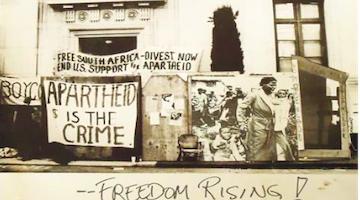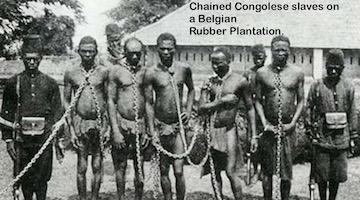BAR Book Forum: Jared A. Loggins and Andrew J. Douglas’ “Prophet of Discontent”
The authors set out to reconstruct King’s critical theory of racial capitalism.
“Dr. King’s critical theory of racial capitalism still gets at the foundations of today’s world order.”
In this series, we ask acclaimed authors to answer five questions about their book. This week’s featured authors are Jared A. Loggin sand Andrew J. Douglas. Loggins is finishing his PhD in political science at Brown Universit. In the fall, he will be a Visiting Assistant Professor of Black Studies and Political Science at Amherst College. Douglas is an associate professor of political science and faculty affiliate in Africana studies and international comparative labor studies at Morehouse College. Their book is Prophet of Discontent: Martin Luther King Jr. and the Critique of Racial Capitalism.
The open-access version is free to read here:
Roberto Sirvent: How can your book help BAR readers understand the current political and social climate?
Jared A. Loggins and Andrew J. Douglas: Relative to the King studies literature, this book is fairly unique in that it is a work in critical theory, and not a more typical or straightforward history of King and the civil rights era. We set out to reconstruct King’s critical theory of racial capitalism, which means that we sift through his writings and conversations and activism and distill some of the implicit theoretical commitments that his criticism presupposes. And theories can often endure over time, remaining relevant and insightful even through historical change. While historians are right to stress that much has changed since King’s death in 1968, his critical theory of racial capitalism still gets at the foundations of today’s world order, the logic and inner workings of the racial and political economy of our contemporary moment—a moment in which poor and working-class Black people are especially prone to state-sanctioned vulnerability and pre-mature death.
The reality is that capitalism grew up alongside anti-Black racism. That’s the only capitalism we’ve ever known. We’re not talking about abstractions here: the history of capitalism is the history of African enslavement, dispossession, and imperialism. It is a history that has cast a long shadow over the present. “We still have slavery,” King said in 1962. Capitalism still requires and reproduces racial inequality as a matter of course. The circuits of accumulation are still managed through anti-Black violence—the partitioning and policing and underdevelopment of Black populations. King’s analysis was attentive to all of this. And so, while we’ve moved into a new phase of globalized, financialized capitalism since King’s death, while the rise of the Black electoral class can be said to reflect a contrast with the political landscape of the 1950s and 60s, the fundamentals of King’s critical theory remain relevant. Our sense is that this book might help contemporary readers resist certain reformist ideologies, perhaps a certain confidence that “progress” is afoot. King’s legacy, we argue, calls for more fundamental anti-capitalist and abolitionist organizing.
What do you hope activists and community organizers will take away from reading your book?
Let us immediately walk back some of what we just said! Or perhaps offer a qualification. While today’s insurgent Black movements carry on the abolitionist legacies of the past, often leaning on the same basic theoretical analyses of capitalist imperialism and state violence that King did, today’s organizers have also helped to amplify a wider range of the experiences and resistance struggles of frontline bearers of racial capitalism. This has helped us better understand both the extent of racial capitalist dominion, its intersections with gender, sexuality, religion. It has also helped improve our understanding of the pressure points that can be exploited to weaken the system’s hold. Part of what we hope activists will take from this book is an appreciation for how today’s generation has expanded and extended a kernel of critical analysis and resistance struggle that King only glimpsed, often imperfectly.
This book situates King in the Black radical tradition. And one of the key lessons of that tradition is that theory is shaped by praxis. While fundamentals of the theory endure, as we noted above, in other ways the struggle evolves and the theory does too. In the book, we talk about how King was moved to expand his thinking about the welfare state and patriarchal notions of a family wage. He was pushed to evolve through interactions with welfare rights organizers, Black queer women such as Johnnie Tillmon. We discuss how his thinking about global capitalism evolved as a result of lessons he learned from foot soldiers in the Black freedom struggle, both in the U.S. and worldwide. At the time of his death, King still had much to learn. But we hope this book will give organizers an appreciation for how they carry on King’s anticapitalism through their new teachings and revelations.
We know readers will learn a lot from your book, but what do you hope readers will un-learn? In other words, is there a particular ideology you’re hoping to dismantle?
In one sense, the entire book is about dismantling the ideologies of white, bourgeois, liberal, imperialist society. King is an interesting figure here because he is so frequently claimed by moderate liberals and reformists who still think of themselves as capitalists to their bones. King was called into action and thrust to the forefront of a national movement in the 1950s in a way that amplified a reformist, civil rights liberalism and tended to background bolder economic claims. But undergirding what he called the “first phase” of the movement was a steady sense that real liberation requires the redistribution of wealth and an economic system that does not commodify everything and thereby reduce the value of humanity to whatever the market will bear. King became more outspoken about this after 1965, during what he called the “second phase” of his work.
As we discuss in the book, this second phase entailed going beyond the critique of ideology. Traditionally, ideology critique has been concerned to expose and work through false perceptions or “false consciousness,” to get people to see that what they’ve been taught to think about the world is misleading and perhaps contributing to their ongoing oppression. And certainly King was engaged in this kind of ideology critique. He frequently sought to correct misleading narratives, such as the discourse around “right-to-work” laws. But we argue that King’s analysis of capitalism went beyond how we think about the world. He knew that his call for a “radical revolution of values” was complicated by the production and circulation of value under capitalism. He knew that we can’t simply change how we value one another by correcting our perceptions and changing how we think. We cannot simply will ourselves to do right by others. We need to change the material structure of a world that essentially requires each of us to commodify and devalue humanity, and fundamentally Black humanity. This entails dismantling the ideologies of racial capitalist society. But it also entails actually dismantling racial capitalist society. This distinction is important. We are not simply up against the “wisdom” of a world that devalues Black life; we are up against a society structured to materially reproduce this devaluation.
Who are the intellectual heroes that inspire your work?
The intellectuals and activists on which the book draws include Vincent Harding, Stephen Henderson, William Strickland, Howard Dodson, Walter Rodney, Sylvia Wynter, C. L. R. James, Grace Lee Boggs, James Boggs, W. E. B. Du Bois, Karl Marx, Ella Baker, Johnnie Tillmon, Coretta Scott King, Cornel West, Cedric Robinson, Ruth Wilson Gilmore, Robin D.G. Kelley.
Even so, there is a certain danger in responding to the question in the way that we have. We want to stress that the true sources of inspiration for us, and really for all the figures mentioned above, are the frontline bearers of racial capitalism from whom a critical, abolitionist horizon emerges in the first place. The above figures were embedded in an indigenous struggle with the material conditions of anti-blackness. Rebellious impulses are significations of the Black radical tradition, exemplary signs of the people’s self-activity. We see them, for example, in the uprisings last summer in response to the murder of George Floyd.
It is worth highlighting Robinson, in particular, since so much of our understanding of the Black radical tradition is indebted to his 1983 classic, Black Marxism: The Making of the Black Radical Tradition. For Robinson, a critique of Marxism’s failures to register the obviously racist nature of capitalism’s logic and development cleared the way for his identification of a Black radical tradition that, in various ways, rejected property and violence and Western notions of governance, and sought to imagine wholly new ways of living and being together—such as King’s vision of the beloved community. In time, Robinson argued, renegade intellectuals like Du Bois and James came to understand themselves as embedded in an indigenous struggle against the whole culture of race in the modern world—its partitioning, its imperialism, its violence. King is no different in this regard. His second-phase legacy can be understood as a thoroughgoing refusal of racial capitalist dominion, routed through the material struggles of the Black poor and working-class.
In what way does your book help us imagine new worlds?
Many of the heroes noted above were associated with the Institute of the Black World (IBW) in the 1970s. The IBW was an Atlanta-based think tank and center for Black scholar-activism that broke off from the King Memorial Center in 1969, largely to evade the strictures of corporate philanthropy that had descended upon the King name. The IBW very deliberately sought to pursue the more radical and Pan-African dimensions of King’s legacy. Our book’s concluding chapter considers the IBW as a case study in the kinds of institutional spaces that might nurture the critique of racial capitalism and the imagination of new worlds.
IBW co-founder Vincent Harding raised an important set of questions: “What institutions must be discarded now in order that they may be more fully prepared to break the circle of white power? What chances and risks must we take in our own time in order to help them towards better positions for their own overcoming movement?” His point was that so many of our established institutions—our schools, our research centers, our foundations and nonprofits—are so thoroughly subsumed under racial capitalist dominion that even their best works may on balance prove counterproductive. To be sure, there are subversive possibilities from within. This book, for example, through the support of a foundation grant has been made available open access, free to read and share. But to what extent is the foundation, the press, the internet infrastructure, not to mention other forms of material support that make the writing of this or any book possible, still implicated in the reproduction of the racial capitalist edifice? The IBW raised these kinds of uncomfortable questions, very much in the spirit of King’s efforts to forge new institutions for a new world. And these questions endure today—for example, in the work of INCITE! and others struggling to transcend the nonprofit industrial complex.
The point we press at the end of the book is that struggle is the key to shaping a new world. There are many reasons to be pessimistic about the prospects of a future without racial capitalism. The possessive hold has gripped us so. Yet, discontent can give way to action. After all, it is that powerful sense of no longer being resigned to discontent and disillusionment that enlarges the horizon for us.
Roberto Sirvent is editor of the Black Agenda Report Book Forum.
COMMENTS?
Please join the conversation on Black Agenda Report's Facebook page at http://facebook.com/blackagendareport
Or, you can comment by emailing us at comments@blackagendareport.com



















